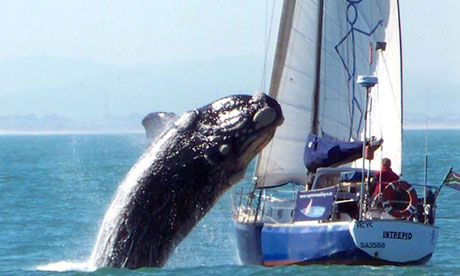
The Risso's dolphin has been studied in several locations around the world, but information on this cetacean species remains relatively scant. Risso's dolphins are not particularly shy or elusive and can be studied with relative ease in areas where continental slope waters are close to shore. In the Mediterranean Sea they are relatively widespread but not abundant and their occurrence can be unpredictable, possibly due to wide-ranging movements. This factor, together with generally low densities, has precluded sustained, focussed investigations of their ecology and behaviour.
Even within the few Mediterranean areas where Risso's dolphins are known to be consistently present, only limited information has been obtained. In large parts of the region there is nothing more than a few sightings or strandings to indicate their presence. In sum, the distribution, ecology, status and trends of this species in the Mediterranean remain somewhat mysterious. On one hand this hampers conservation, but on the other hand it offers scope for novel studies.
In the Mediterranean Sea, modern field studies of cetaceans began in the late 1980s and this has resulted in rapid advances in knowledge of several of the species known to occur regularly in the region. The Risso's dolphin, however, remains one of the least-known cetacean species in the region and has been the subject of few dedicated studies. A regional
IUCN Red List workshop in March 2006 concluded that the Mediterranean subpopulation of the Risso's dolphin is ‘Data Deficient’.
A recent scientific review of the ecology and status of the Risso’s dolphin in the Mediterranean Sea, published in the renowned journal Mammalian Biology, sheds new light on a largely neglected species. This work - funded by
OceanCare and
WDCS The Whale and Dolphin Conservation Society - was conducted by a group of five scientists led by Giovanni Bearzi, President of the
Tethys Research Institute. The second author is Randall R. Reeves, Chair of the IUCN Cetacean Specialist Group. One of the main purposes of the review is to identify knowledge gaps and areas where focussed studies should be conducted to inform conservation efforts aimed to protect Risso’s dolphins in Mediterranean waters.
Risso's dolphins occur in continental slope waters throughout the Mediterranean basin and around many of the region's offshore islands and archipelagos. No synoptic estimate of abundance is available for the Mediterranean region, but densities and overall numbers are low in comparison to some other small odontocetes. Diet consists primarily of cephalopods, with a clear preference for mesopelagic squid.
The paper by Bearzi and colleagues reviews available information on the distribution and ecology of Risso's dolphins in the Mediterranean and identifies factors that may negatively affect them in this region. The principal known threat to populations in the Mediterranean is entanglement in pelagic drift gillnets. Other potential problems for Risso's dolphins in the Mediterranean include noise disturbance and ingestion of plastic debris.
Inclusion of Risso's dolphin habitat in networks of offshore protected areas would be one way of addressing threats to this species in the mid to long term. Indeed, various MPAs have been proposed to protect the habitat of deep-water cetacean species (including Risso's dolphin) in Spanish Mediterranean waters and there are prospects for Specially Protected Areas of Mediterranean Importance (SPAMIs) in areas beyond national jurisdiction. If effectively managed, deep-water or offshore protected areas could have long-term conservation benefits for Risso's dolphins. Pending the implementation of such area-based management strategies, any actions taken to mitigate immediate and well-known threats to cetaceans and other large marine vertebrates in the Mediterranean region, particularly entanglement in pelagic gillnets (driftnets), are bound to benefit Risso's dolphins. Considering that driftnetting is already illegal in EU waters, what is most needed is strict enforcement of that ban and its extension to the high seas and to waters under non-EU State jurisdiction.
THE REVIEW:
Bearzi G., Reeves R.R., Remonato E., Pierantonio N., Airoldi S. 2010. Risso’s dolphin Grampus griseus in the Mediterranean Sea. Mammalian Biology. DOI: 10.1016/j.mambio.2010.06.003PHOTO:
These Risso's dolphin mother and calf photographed in the Ligurian Sea show the characteristic morphology and pigmentation of the species. Photo © Caterina Lanfredi / Tethys Research Institute.











